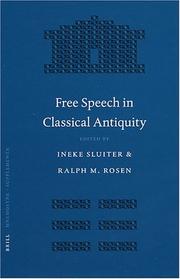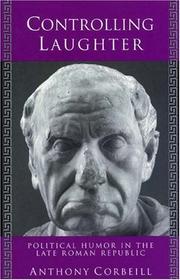| Listing 1 - 6 of 6 |
Sort by
|
Book
ISBN: 9780198788201 0198788207 9780191092305 0191092304 0191092312 019183016X Year: 2018 Publisher: Oxford, United Kingdom: Oxford university press,
Abstract | Keywords | Export | Availability | Bookmark
 Loading...
Loading...Choose an application
- Reference Manager
- EndNote
- RefWorks (Direct export to RefWorks)
Public speech was a key aspect of politics in Republican Rome, both in theory and in practice, and recent decades have seen a surge in scholarly discussion of its significance and performance. Yet the partial nature of the surviving evidence means that our understanding of its workings is dominated by one man, whose texts are the only examples to have survived in complete form since antiquity: Cicero. This collection of essays aims to broaden our conception of the oratory of the Roman Republic by exploring how it was practiced by individuals other than Cicero, whether major statesmen, jobbing lawyers, or, exceptionally, the wives of politicians. It focuses particularly on the surviving fragments of such oratory, with individual essays tackling the challenges posed both by the partial and often unreliable nature of the evidence about these other Roman orators-often known to us chiefly through the tendentious observations of Cicero himself-and the complex intersections of the written fragments and the oral phenomenon. Collectively, the essays are concerned with the methods by which we are able to reconstruct non-Ciceronian oratory and the exploration of new ways of interpreting this evidence to tell us about the content, context, and delivery of those speeches. They are arranged into two thematic Parts, the first addressing questions of reception, selection, and transmission, and the second those of reconstruction, contextualization, and interpretation: together they represent a comprehensive overview of the non-Ciceronian speeches that will be of use to all ancient historians, philologists, and literary classicists with an interest in the oratory of the Roman Republic. - Publisher.
Book
ISBN: 9781108429016 9781108681476 9781108452861 1108429017 1108606156 1108621716 1108681476 Year: 2018 Publisher: Cambridge: Cambridge university press,
Abstract | Keywords | Export | Availability | Bookmark
 Loading...
Loading...Choose an application
- Reference Manager
- EndNote
- RefWorks (Direct export to RefWorks)
"Institutions and Ideology in Republican Rome This volume brings together a distinguished international group of researchers to explore public speech in Republican Rome in its institutional and ideological contexts. The focus throughout is on the interaction between argument, speaker, delivery and action. The chapters consider how speeches acted alongside other factors - such as the identity of the speaker, his alliances, the deployment of against opponents, physical location and appearance of other members of the audience, and non-rhetorical threats or incentives - to affect the beliefs and behaviour of the audience. Together they offer a range of approaches to these issues and bring attention back to the content of public speech in Republican Rome as well as its form and occurrence. The book will be of interest not only to ancient historians, but also to those working on ancient oratory and to historians and political theorists working on public speech" --
Oratory, Ancient. --- Political oratory --- Rhetoric, Ancient. --- Rome --- History --- Politics and government --- Oratory, Ancient --- Rhetoric, Ancient --- Rome ancienne --- --Politique et gouvernement --- --République --- --Rhétorique --- --Oratoire --- --Rome --- Political oratory - Rome --- Politique et gouvernement --- République --- Rhétorique --- Oratoire --- Rome - Politics and government - 265-30 B.C. --- Rome - History - Republic, 265-30 B.C. --- Politics and government.
Book
ISBN: 2870311621 9782870311622 Year: 1994 Volume: 222 Publisher: Bruxelles: Latomus,
Abstract | Keywords | Export | Availability | Bookmark
 Loading...
Loading...Choose an application
- Reference Manager
- EndNote
- RefWorks (Direct export to RefWorks)
Examines a particular group of Roman temples built with a façade speakers' platform, which were apparently used for both religious and political activities.
Architecture [Roman ] --- Architecture romaine --- Architectuur [Romeinse ] --- Bouwkunst [Romeinse ] --- Histoire et culture romaines --- Roman architecture --- Romeinse architectuur --- Romeinse bouwkunst --- Romeinse geschiedenis en cultuur --- Tempels [Romeinse ] --- Temples [Roman ] --- Temples romains --- Architecture, Roman --- Classical antiquities --- Oratory, Ancient --- Temples, Roman --- Antiquités gréco-romaines --- Eloquence antique --- Political aspects --- Aspect politique --- Temples --- Political oratory --- Architecture and state --- -Political oratory --- -Temples --- -726.109376 --- 808.51 --- Architecture --- Church architecture --- Religious institutions --- Parliamentary oratory --- Political speaking --- Oratory --- Politics, Practical --- Public speaking --- Rhetoric --- State and architecture --- Arts Architecture Religious buildings Temples and shrines Ancient world Italy Latium Rome --- Literature Rhetoric of speech Public speaking (Oratory) --- Antiquités gréco-romaines --- 726.109376 --- Temples - Rome. --- Political oratory - Rome. --- Architecture and state - Rome. --- Religious architecture --- Orateurs --- Rome

ISBN: 9004139257 9786610915354 9047405684 1280915358 1429408413 9789004139251 9781429408417 9781280915352 6610915350 9789047405689 Year: 2004 Volume: 254 Publisher: Leiden: Brill,
Abstract | Keywords | Export | Availability | Bookmark
 Loading...
Loading...Choose an application
- Reference Manager
- EndNote
- RefWorks (Direct export to RefWorks)
This book contains a collection of essays on the notion of "Free Speech" in classical antiquity. The essays examine such concepts as "freedom of speech," "self-expression," and "censorship," in ancient Greek and Roman culture from historical, philosophical, and literary perspectives. Among the many questions addressed are: what was the precise lexicographical valence of the ancient terms we routinely translate as "Freedom of Speech," e.g., Parrhesia in Greece, Licentia in Rome? What relationship do such terms have with concepts such as isegoria, demokratia and eleutheria; or libertas, res publica and imperium? What does ancient theorizing about free speech tell us about contemporary relationships between power and speech? What are the philosophical foundations and ideological underpinnings of free speech in specific historical contexts?
Classical literature --- Politics and literature --- Law and literature --- Freedom of speech in literature --- Freedom of speech --- Political oratory --- Oratory, Ancient --- History and criticism --- History --- Politics --- Littérature ancienne --- Politique et littérature --- Droit et littérature --- Liberté d'expression --- Eloquence politique --- Eloquence antique --- Congresses --- Histoire et critique --- Congrès --- Histoire --- Literature --- Literature and politics --- Parliamentary oratory --- Political speaking --- Oratory --- Politics, Practical --- Public speaking --- Rhetoric --- Literature and law --- Free speech --- Liberty of speech --- Speech, Freedom of --- Civil rights --- Freedom of expression --- Assembly, Right of --- Freedom of information --- Intellectual freedom --- Political aspects --- Law and legislation --- Greece --- Oratory [Ancient ] --- To 500 --- Rome --- Congresses. --- Classical literature - History and criticism - Congresses. --- Politics and literature - Greece - Congresses. --- Law and literature - History - To 500 - Congresses. --- Politics and literature - Rome - Congresses. --- Freedom of speech in literature - Congresses. --- Freedom of speech - Greece - Congresses. --- Political oratory - Greece - Congresses. --- Freedom of speech - Rome - Congresses. --- Political oratory - Rome - Congresses. --- Oratory, Ancient - Congresses.

ISBN: 0691027390 1322886016 0691602239 0691631778 1400872898 9780691027395 Year: 1996 Publisher: Princeton (N.J.): Princeton university press,
Abstract | Keywords | Export | Availability | Bookmark
 Loading...
Loading...Choose an application
- Reference Manager
- EndNote
- RefWorks (Direct export to RefWorks)
Although numerous scholars have studied Late Republican humor, this is the first book to examine its social and political context. Anthony Corbeill maintains that political abuse exercised real powers of persuasion over Roman audiences and he demonstrates how public humor both creates and enforces a society's norms.Previous scholarship has offered two explanations for why abusive language proliferated in Roman oratory. The first asserts that public rhetoric, filled with extravagant lies, was unconstrained by strictures of propriety. The second contends that invective represents an artifice borrowed from the Greeks. After a fresh reading of all extant literary works from the period, Corbeill concludes that the topics exploited in political invective arise from biases already present in Roman society. The author assesses evidence outside political discourse-from prayer ritual to philosophical speculation to physiognomic texts-in order to locate independently the biases in Roman society that enabled an orator's jokes to persuade. Within each instance of abusive humor-a name pun, for example, or the mockery of a physical deformity-resided values and preconceptions that were essential to the way a Roman citizen of the Late Republic defined himself in relation to his community.Originally published in 1996.The Princeton Legacy Library uses the latest print-on-demand technology to again make available previously out-of-print books from the distinguished backlist of Princeton University Press. These editions preserve the original texts of these important books while presenting them in durable paperback and hardcover editions. The goal of the Princeton Legacy Library is to vastly increase access to the rich scholarly heritage found in the thousands of books published by Princeton University Press since its founding in 1905.
Political oratory --- -Humor --- -Wit and humor --- -Bons mots --- Jests --- Jokes --- Ludicrous, The --- Ridiculous, The --- Wit and humor, Primitive --- -Humor. --- Political ethics --- -Political oratory --- -Politics and culture --- -Culture --- Culture and politics --- Parliamentary oratory --- Political speaking --- Ethics, Political --- Ethics in government --- Government ethics --- Political science --- Politics, Practical --- Bons mots --- Facetiae --- Humor --- Social aspects --- Political aspects --- Moral and ethical aspects --- Rome --- Rim --- Roman Empire --- Roman Republic (510-30 B.C.) --- Romi (Empire) --- Politics and government --- Politics and culture --- Wit and humor --- Culture --- Oratory --- Public speaking --- Rhetoric --- Ethics --- Civics --- Byzantine Empire --- Rome (Italy) --- Humor. --- -Politics and government --- Social aspects. --- Wit and humor - Social aspects --- Political ethics - Rome --- Politics and culture - Rome --- Political oratory - Rome --- Rome - - Politics and government - - Humor --- -Political ethics --- Rome -
Book
ISBN: 8842051241 9788842051244 Year: 1997 Volume: 86 Publisher: Roma: Laterza,
Abstract | Keywords | Export | Availability | Bookmark
 Loading...
Loading...Choose an application
- Reference Manager
- EndNote
- RefWorks (Direct export to RefWorks)
Ancient rhetoric --- Antieke retoriek --- Retoriek [Antieke ] --- Retoriek van de Oudheid --- Rhetoric [Ancient ] --- Rhétorique ancienne --- Rhétorique de l'Antiquité --- Speeches, addresses, etc., Latin --- Political oratory --- Rhetoric, Ancient --- Discours latins --- Eloquence politique --- History and criticism --- Histoire et critique --- Cicero, Marcus Tullius --- Criticism and interpretation. --- Rome --- Politics and government --- Rhetoric, Ancient. --- History and criticism. --- -Rhetoric, Ancient --- -Speeches, addresses, etc., Latin --- -Latin orations --- Latin speeches --- Classical languages --- Greek language --- Greek rhetoric --- Latin language --- Latin rhetoric --- Parliamentary oratory --- Political speaking --- Oratory --- Politics, Practical --- Public speaking --- Rhetoric --- History --- -History and criticism --- Political aspects --- -T︠S︡it︠s︡eron, Mark Tulliĭ --- Cyceron --- Cicéron --- Kikerōn --- Cicerón, M. Tulio --- Ḳiḳero --- Cicerone --- Cicerón, Marco Tulio --- Ḳiḳero, Marḳus Ṭulyus --- Tullius Cicero, Marcus --- Kikerōn, M. T. --- Cicerone, M. T. --- Cicerone, M. Tullio --- Cicero --- Cicero, M. T. --- Cyceron, Marek Tulliusz --- ציצרון, מארקוס טולליוס --- קיקרו, מארקוס טוליוס --- קיקרו, מרקוס טוליוס --- キケロ --- 西塞罗 --- Criticism and interpretation --- -History --- -Criticism and interpretation --- -Classical languages --- Latin orations --- -Cicero, Marcus Tullius --- Cicéron, Marcus --- Rhétorique ancienne --- -Cicero --- Speeches, addresses, etc. [Latin ] --- Republic, 265-30 B.C. --- M. Tulli Ciceronis --- T︠S︡it︠s︡eron, Mark Tulliĭ --- Speeches, addresses, etc., Latin - History and criticism. --- Political oratory - Rome.
| Listing 1 - 6 of 6 |
Sort by
|

 Search
Search Feedback
Feedback About UniCat
About UniCat  Help
Help News
News